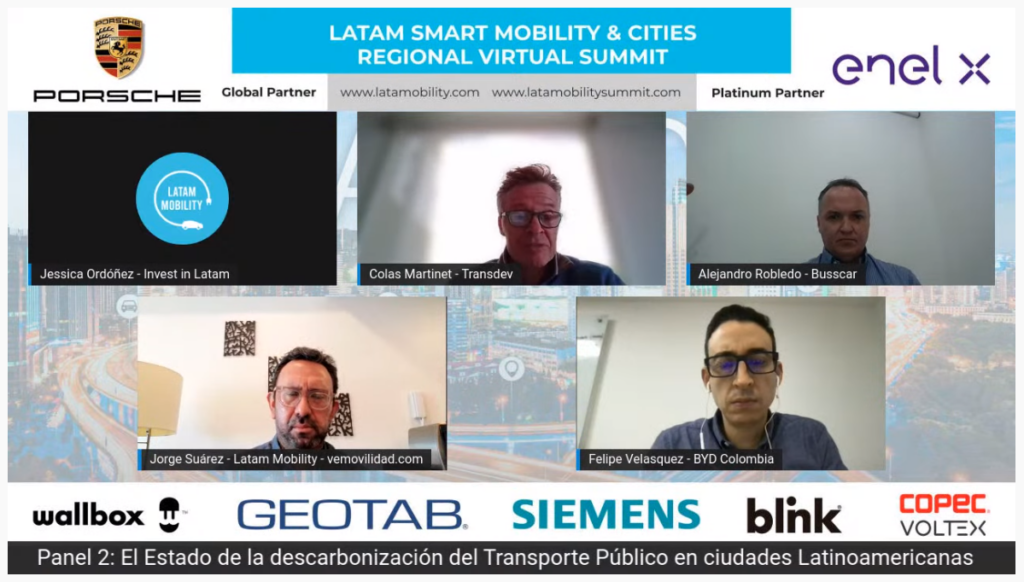Cities are responsible for 70% of carbon dioxide emissions, or Greenhouse Gases (GHG) which contribute to climate change, according to the United Nations (UN) so accelerating actions to help decarbonization efforts on urban areas is essential to advance towards the 2015 Paris Agreement.
The transportation sector also produces significant amounts of polluting emissions, which by 2018, represented 15% of all GHG emissions for the region, and was the sector with the highest growth rate, according to information from the United Nations Environment Program (UNEP).
In this sense, Latam Mobility, a leading community for sustainable mobility in the continent, organized the panel “The Status of Decarbonization of Public Transportation in Latin American Cities“, as part of the program of the “Latam Smart Mobility & Cities Virtual Summit“.
The event was attended by representatives of important companies showcasing their progress on one of the main challenges for the region: the road towards the transition to use clean fuels and the eventual decarbonization of transportation.
Profitability is Crucial
Alejandro Robledo, National and International Commercial Manager at Busscar, a bodywork manufacturer, explained that one of the key points for the Latin American industry is the profitability of fleets. “The gap in transport decarbonization will narrow as more profitable vehicles are manufactured; tailor-made for each city’s needs, with dimensions, weights, and passenger configuration, according to the requirements”.
“We are at a transition point towards electromobility, and we must ensure that electric fleets become profitable in the medium term, so that they approach the costs of fossil fuel combustion. Currently, at Busscar we have an important production peak of electric vehicles, which reached the same level as diesel vehicles, and in the next three months we will deliver 400 units”, Robledo pointed out.
He also noted that more data is available than was the case a few years ago, and as a result, a more efficient and leaner business model can be built. However, he said that “public transportation requires a lot of help from the States, although progress is being made on more solid ground during the transition process”.
Regarding the adaptation process towards new technologies, Robledo explained that there have been changes at Busscar: “One of the main challenges has been to protect and modify the production processes, with the aim of taking care of the chassis: now, the electric vehicle chassis is painted first and then assembled, so as not to expose batteries to any change in temperature and take care of the entire powertrain”.
Advice: a High Point
The panel included Colás Martinet, SVP Business Development LATAM of Transdev, a leading company in operations and integration of global mobility for passenger service, who said: “We are about to start operating 406 electric passenger vehicles in Bogota, Colombia, with BYD chassis, which will operate for 15 years. In addition, we are about to operate 250 electric buses in Chile, a subway line in Sao Paulo, Brazil, and soon articulated buses”.
Martinet expressed that “before talking about operation and maintenance, the bus and infrastructure investment must be clear, which is large, because the routes, chargers, batteries, and more must be organized, since these are integrated projects, and a very good choice must be made”.
In addition, the Transdev representative said that the operating companies have the experience to advise on the types of vehicles, investment costs and business plan, as well as provide the authority with solutions at the same price as those used so far in public transport.
“In Bogotá, for example, the authority assigns us the operation, but we can also make a combined offer with the investment. In the case of Chile, we recently obtained a tender with two lots of transport vehicles to be operators, but companies can contribute and help state organizations,” he concluded.
Business Evolution
Also attending the event was Juan Felipe Velásquez, Commercial Manager of BYD Motors Colombia, a transport vehicle manufacturer, which is currently about to deliver 1,400 buses in Bogotá, and has the first electric vehicle fleet in operation in Medellín, as part of its decarbonization process.
The executive said: “What we have tried to bring to the market is part of the demystification of the electric vehicle. Santiago de Chile is an important example because it was the operators who committed to the electric vehicle.
“The electric bus movement has dynamized the Colombian market; alliances, such as the ones we have with Busscar, facilitate the tailor-made. What must be done is to replicate what we do, seek alliances, with local manufacturing, and structure what the regions require, with their particular conditions and adjusted to their needs. It is to tropicalize the product and understand what they are asking for”, explained Velásquez.
He also explained that innovation wave of electric mobility was affected by the pandemic, as well as the public transportation sector, which saw its renovation and investment plans slowed down, but the economy has already started to wake up. “Organizations are looking at the new developments and reviewing their financial models, so the business must evolve; we cannot stay with the same buses, but see what the customer requires,” concluded Velasquez.




